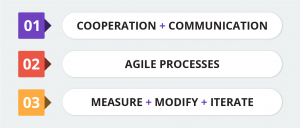 Where should marketers go when they’re looking to improve? To their colleagues. When developers and coders weren’t collaborating so well with system administrators and IT technicians—DevOps was born. DevOps was created to combine important, yet different parts of a Software Project team.
Where should marketers go when they’re looking to improve? To their colleagues. When developers and coders weren’t collaborating so well with system administrators and IT technicians—DevOps was born. DevOps was created to combine important, yet different parts of a Software Project team.
While Developers push software improvements, adding new features and making updates, the Operations team works to stabilize and maintain systems. They tackle bugs and test software changes before they make it end users.
Organizations that use DevOps typically improve products much faster than their competitors. When Amazon, Netflix, and Target are employing DevOps as one piece of their larger operational strategy—you can imagine how effective it is for them. Marketers can learn a lot from how DevOps teams have learned to work together.
From automating repeatable tasks and streamlined communication to rapid feedback cycles and leveraging data to iterate on strategies, there’s a lot to steal from the DevOps playbook.
Read More: Leveraging the Power of Linkedin for Marketing/Sales Professionals
How the DevOps Approach Can Enhance Marketing
Marketing and DevOps have the same goals. They both want the company to be successful. They want the company to find and acquire new customers. They want your products and services to constantly improve.
Without customers to engage with your products and services, there’d be no product to improve. If you’re not enhancing the product, it will be difficult to attract and retain customers. As you can see, Marketing and DevOps are deeply interdependent. Let’s dig into specific ways DevOps can positively influence your Marketing operations.
Maintain Ongoing Communication
It’s all about continuous feedback within DevOps. The team needs to know how specific changes will impact the overall business goal. Armed with a strong understanding of these changes, marketers can improve the messaging they dish out to customers.
Customers are often deeply focused on quality. Knowing this, your Marketing content should highlight how quality assurance is baked into your development process. Getting that right requires tight communication between DevOps and Marketing.
Enforce Message Consistency
Developers are always looking to improve what they’ve built. Use that to your advantage.
A focus on innovation puts any modern business on good footing when it comes to placing their products into the competition. At the same time, your Marketing team needs to know precisely how that product or service is superior. That knowledge then needs to find its way into Marketing campaigns and reach the customer at the right time using the best possible channel.
Whether they’re putting out retargeting ads or white papers, the Marketing team will need to enforce a consistent message about the product aligned to its development.
Leverage Those Analytics
Remember that each piece of Marketing content has its own objective. That objective should be determined by taking a close look at the Data Analytics that inform the broader Marketing strategy. Marketing should link back to specific metrics and solution tags that derive from the product development process. This is how customers gain an understanding of what a product can do for them.
Major products like Amazon Alexa and Google Home provide a ton of predictive analytics about customer behavior. Marketers can put that wealth of data to good use by advertising the incremental improvements made to these and related products over time. That’s how to outfox the competition.
Read More: Analyzing the Big Five Traits Your Brand Personality Needs to Be Reputable
Key DevOps Strategies Marketers Can Implement Tomorrow
Collaborate and Communication, Constantly
Poor communication is expensive. $62.4 million per year expensive for large companies on average. When Marketing and Sales teams adopt a DevOps mentality, they can maximize their shared efforts. Marketing teams can improve their Marketing content with information that the Sales team gathers from conversations with clients.
On the flip side, the Sales team needs Marketing content to do its job. Better communication helps each team determine when and how to deliver in order to support each other.
The same goes for leads. The Marketing team will have many qualified leads that must make it into the Sales pipeline. Any effort to free up salespeople from searching for and qualifying leads is time well spent.
Move to Agile Processes
Many companies are moving to automate big pieces of their Marketing operation. Just like DevOps prioritizes high speed and ongoing delivery, Marketing Automation functions to ensure that Marketing campaigns run effectively and smoothly by adapting data insights into continuous changes in these campaigns. Luckily, marketers have lots of fancy Automation tools at their disposal.
Chatbots reduce business costs by over $8 billion each year (by 2022). Email automation allows for the delivery of personalized Marketing content to customers backed by data-driven insights. Ad retargeting automation empowers marketers to serve customers with timely and personalized ads in order to drive conversions.
While DevOps teams use automation to reduce the impact of human error and drive key data insights into development processes, Marketing teams also enhance their practice using Automation as a key tool for improvement.
Measure and Improve
It’s easy to get all in your feelings—like a certain Canadian rapper—about the data (especially when it’s not good). But you want the data. You need the data. You should be down for the data always.
Marketers should be consistently learning from customer data in order to improve how they engage with new and existing customers. Marketing teams must deliver targeted campaigns with proven ROI, increase the quality of leads and conversion rates, while also securing clear increases in customer satisfaction.
Marketing teams must conduct regular relevance checks to see how Marketing content is performing and make course corrections along the way. The market is moving fast and keeping up with customers demands such a rapid pace.
Putting The DevOps Mentality to Work in Your Marketing Strategy
Like DevOps, the Marketing team can streamline how they communicate, employ new tools for measurement and iteration, and embrace agile processes to improve their work finding and attracting customers. Modern Marketing teams need the capacity to quickly deploy, test, measure, and re-deploy content across every Marketing channel.
A traditional CMS with siloed systems just won’t cut it. Your Marketing team needs a flexible architecture (such as a powerful headless CMS) for its Marketing content management. This Marketing tool should allow for Marketing Automation and the integration of vast quantities of data in order for your marketing teams to be effective and for your company to stay competitive.
Read More: Personalization Should Bring Context to the Customer to Drive Lifetime Value












